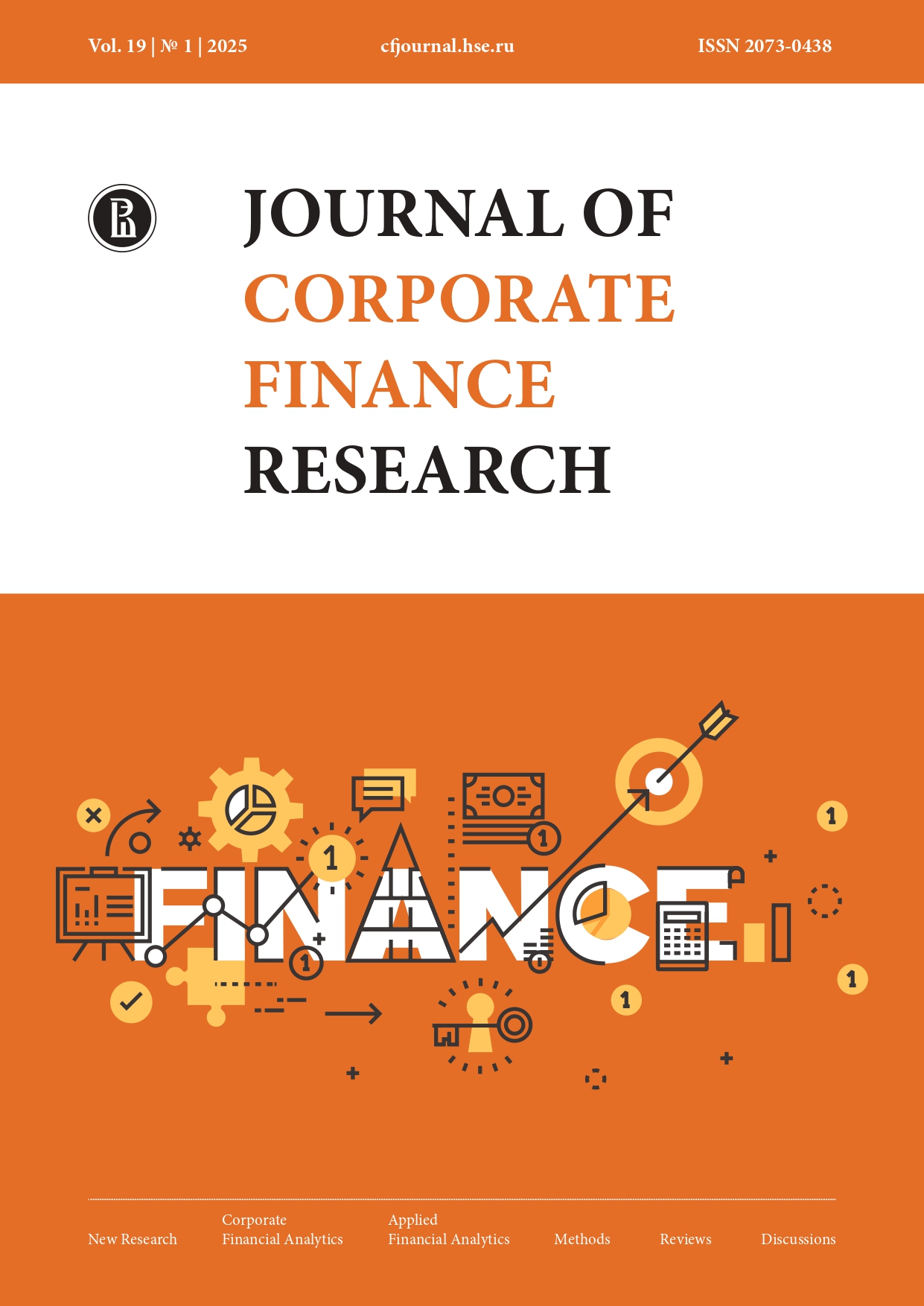Resilience Index Development for Digital Ecosystems and Its Implementation: The Case of Russian Companies
Abstract
Study examines the problems of business ecosystems, whose effectiveness and sustainability are determined by the organization of cooperation of all its participants using digital tools. The purpose of the research is to develop an index of digital ecosystem sustainability that would reflect changes in the value of the company. The article defines the main characteristics of digital business ecosystems by adapting the taxonomy of digital ecosystems to the Russian market and measuring the sustainability of Russian companies as Yandex and VK Group by using the digital ecosystem sustainability index (DESIn) that was developed by the authors for determining the strategic position of companies in the market. The authors identified the main classification features of digital ecosystems and measured their stability using financial and non-financial indicators as part of the DESIn index. The results of the research and the developed index of digital ecosystem sustainability can be used by Russian companies for developing their strategies, analysing their competitive positions, and choosing the optimal directions for digital ecosystem development.
Downloads
References
Matthias Koch, Daniel Krohmer, Matthias Naab, Dominik Rost, Marcus Trapp, A matter of definition: Criteria for digital ecosystems, Digital Business, Volume 2, Issue 2, (2022). ISSN 2666-9544, https://doi.org/10.1016/j.digbus.2022.100027
IG1275 Ecosystem Taxonomy v1.0.0, Digital Ecosystem Management Project, – 01.02.2022 https://www.tmforum.org/resources/how-to-guide/ig1275-ecosystem-taxonomy-v1-0-0/
Sarafin Greg Companies that utilize business ecosystems will be better positioned to drive innovation and capital efficiency to create customer value (2021) https://www.ey.com/en_gl/alliances/what-business-ecosystem-means-and-why-it-matters
Tjark Freundt, Paul Jenkins, Tamás Kabay, Hamza Khan, and Istvan Rab, Growth and resilience through ecosystem building (2023) https://www.mckinsey.com/capabilities/growth-marketing-and-sales/our-insights/growth-and-resilience-through-ecosystem-building?cid=eml-web
Kulapov M.N., Pereverzeva E.I., Kirillova O.Yu. (2022) Biznes-ekosistemy: opredeleni-ya, tipologii, praktiki razvitiya [Business ecosystems: definitions, typologies, develop-ment practices]. Voprosy innovatsionnoy ekonomiki. 12. (3). – 1597–1612. doi: 10.18334/vinec. 12.3.115234
Adams, R., Jeanrenaud, S., Bessant, J., Denyer, D., & Overy, P. (2016). Sustainability-oriented innovation: A systematic review. International Journal of Management Reviews, 18(2), 180–205. https://doi.org/10.1111/ijmr.12068
Attanasio G. Preghenella N. De Toni A. Battistella C. (2021). Stakeholder engagement in business models for sustainability: The stakeholder value flow model for sustainable de-velopment. Business Strategy and the Environment, 31(3), 860–874. 10.1002/bse.2922 https://doi.org/10.1002/bse.2922
Freudenreich, Birte, et al. “A Stakeholder Theory Perspective on Business Models: Value Creation for Sustainability.” Journal of Business Ethics, vol. 166, no. 1, 2020, pp. 3–18. JSTOR, http://www.jstor.org/stable/45386888. Accessed 5 Apr. 2024.
Riquelme-Medina Marta, Stevenson Mark, Barrales-Molina Vanesa, Llorens-Montes Francisco Javier, Coopetition in business Ecosystems: The key role of absorptive capaci-ty and supply chain agility, Journal of Business Research, Volume 146, 2022, Pages 464-476, ISSN 0148-2963, https://doi.org/10.1016/j.jbusres.2022.03.071
Prince Kwame Senyo, Kecheng Liu, John Effah, Digital business ecosystem: Literature review and a framework for future research, International Journal of Information Man-agement, Volume 47, 2019, Pages 52-64, ISSN 0268-4012, https://doi.org/10.1016/j.ijinfomgt.2019.01.002 (https://www.sciencedirect.com/science/article/pii/S0268401218305991)
Adner Ron, Puranam Phanish, Zhu Feng, What Is Different About Digital Strategy? (2019) From Quantit ative to Qualitative Change, https://doi.org/10.1287/stsc.2019.0099
Gawer, A. (2022). Digital platforms and ecosystems: remarks on the dominant organiza-tional forms of the digital age. Innovation, 24(1), 110–124. https://doi.org/10.1080/14479338.2021.1965888 (https://www.tandfonline.com/doi/citedby/10.1080/14479338.2021.1965888?scroll=top&needAccess=true)
P.K. Senyo, K. Liu, J. Effah, Digital business ecosystem: literature review and a frame-work for future research, Int. J. Inf. Manag., 47 (2019), pp. 52-64, 10.1016/j.ijinfomgt.2019.01.002 (https://www.sciencedirect.com/science/article/pii/ S0268401218305991)
Kuprevich, T. (2023). Digital business-models: concept, features and directions of de-velopment. URL: http://edoc.bseu.by:8080/handle/edoc/98754
3Shi, Yuwei, and Tom Manning. Understanding Business Models and Business Model Risks. The Journal of Private Equity, vol. 12, no. 2, 2009, pp. 49–59. JSTOR, http://www.jstor.org/stable/43503589. Accessed 5 Apr. 2024.gjty
Taeuscher, Karl & Laudien, Sven. Uncovering the Nature of Platform-based Business Models: An Empirical Taxonomy. (2017) https://www.researchgate.net/publication/307978320_Uncovering_the_Nature_of_Platform-based_Business_Models_An_Empirical_Taxonomy/citations
Dominik Lis Boris Otto Towards a Taxonomy of Ecosystem Data Governance January 2021 DOI:10.24251/HICSS.2021.733 Conference: Proceedings of the 54th Hawaii In-ternational Conference on System Sciences URL: http://hdl.handle.net/10125/71353
Staub, Nicola & Haki, Kazem & Aier, Stephan & Winter, Robert. (2021). Taxonomy of Digital Platforms: A Business Model Perspective. DOI: 10.24251/HICSS.2021.744 (https://www.researchgate.net/publication/348231414_Taxonomy_of_Digital_Platforms_A_Business_Model_Perspective)
Mio, Chiara, Antonio Costantini, and Silvia Panfilo. 2022. Performance measurement tools for sustainable business: A systematic literature review on the sustainability bal-anced scorecard use. Corporate Social Responsibility and Environmental Management 29: 367–84. https://doi.org/10.1002/csr.2206
Gleißner, W., Günther, T. & Walkshäusl, C. Financial sustainability: measurement and empirical evidence. J Bus Econ 92, 467–516 (2022). https://doi.org/10.1007/s11573-022-01081-0 (https://link.springer.com/article/10.1007/s11573-022-01081-0)
Settembre-Blundo, D., González-Sánchez, R., Medina-Salgado, S. et al. Flexibility and Resilience in Corporate Decision Making: A New Sustainability-Based Risk Management System in Uncertain Times. Glob J Flex Syst Manag 22 (Suppl 2), 107–132 (2021). https://doi.org/10.1007/s40171-021-00277-7
Benfer, Martin, et al. “Resilience Measures in Global Production Networks: A Literature Review and Conceptual Framework.” Die Unternehmung, vol. 75, no. 4, 2021, pp. 491–520. JSTOR, https://www.jstor.org/stable/27284470. Accessed 14 Apr. 2024
Rasool, F., Greco, M. and Grimaldi, M. (2022), “Digital supply chain performance met-rics: a literature review”, Measuring Business Excellence, Vol. 26 No. 1, pp. 23-38. https://doi.org/10.1108/MBE-11-2020-0147
Copyright (c) 2025 National Research University Higher School of Economics

This work is licensed under a Creative Commons Attribution-NonCommercial-NoDerivatives 4.0 International License.

